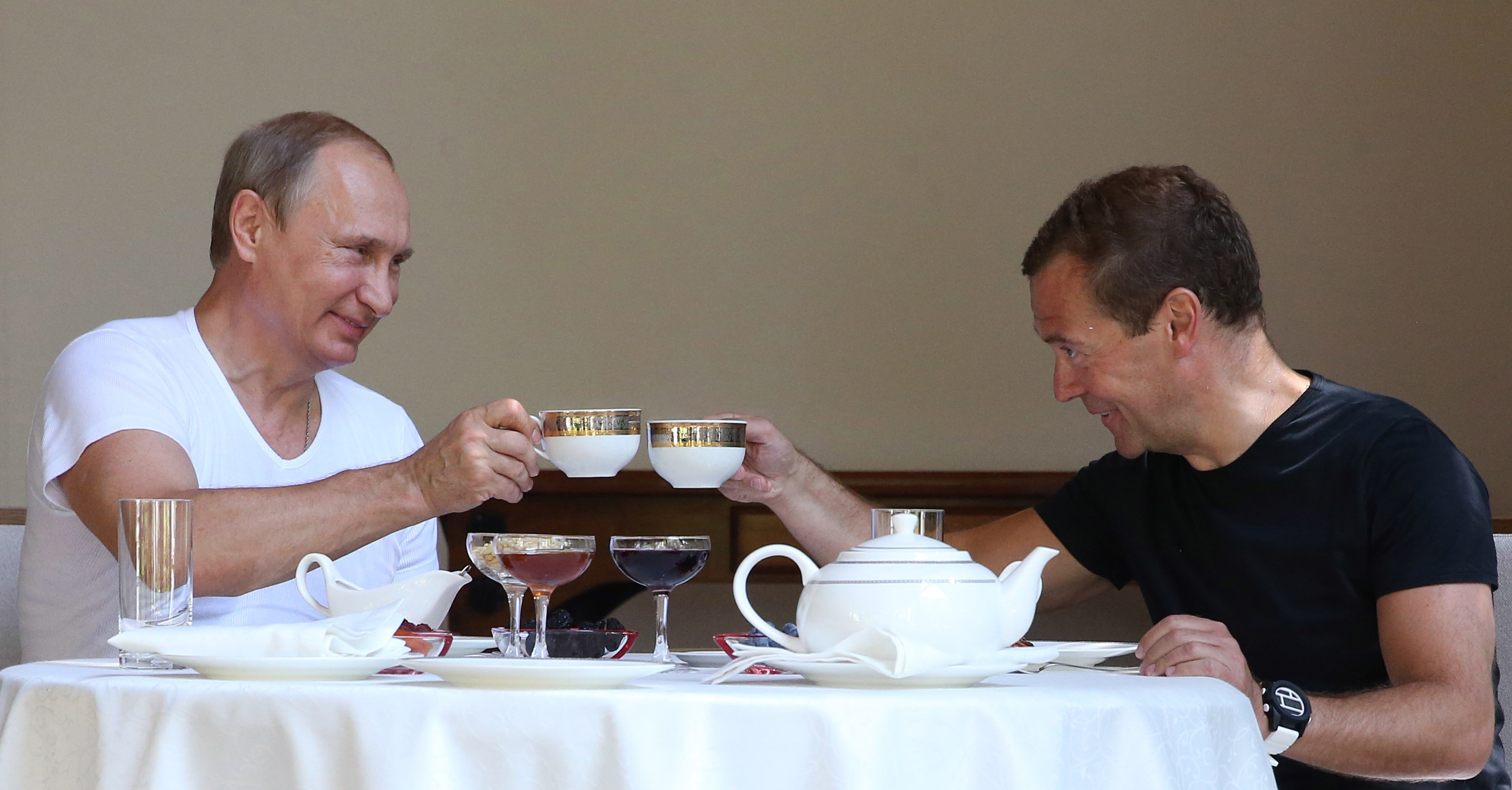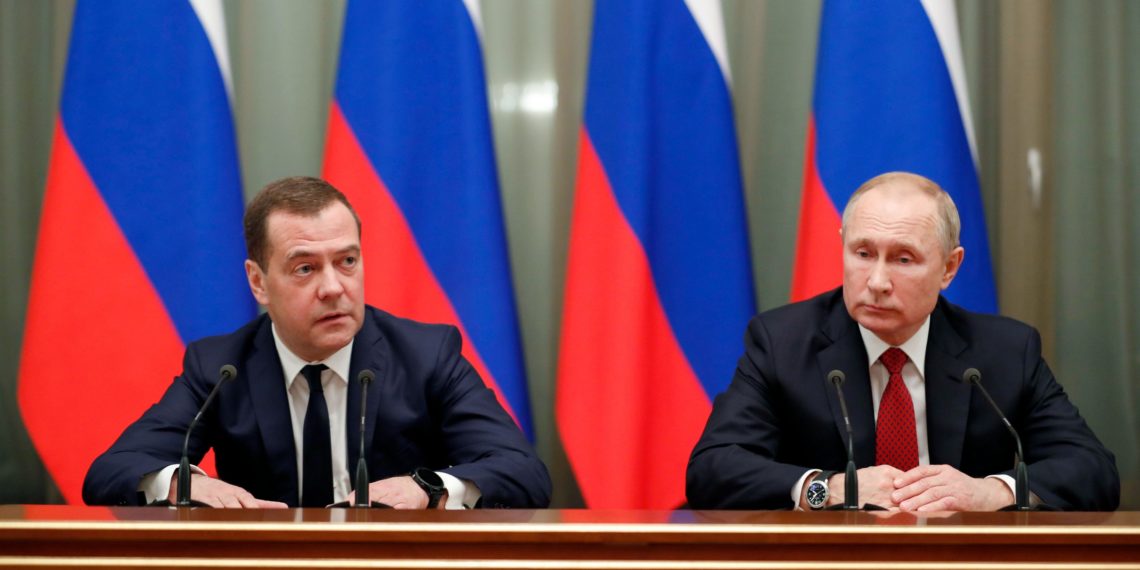Russia’s Putin-Medvedev ruling tandem is officially over.
It all happened unexpectedly after President Vladimir Putin lightly criticized Prime Minister Dmitry Medvedev’s government in his Annual Address. Medvedev resigned immediately. And while Russians were still guessing who the next prime minister might be, Putin swiftly announced that Mikhail Mishustin, the little-known head of the Federal Tax Agency, accepted the job.
This came as a surprise to many high-ranking officials and the public, a tell-tale sign of how the Kremlin operates. In 24 hours, Mishustin got the approval stamp from both chambers of the Russian Duma.
While it is tempting to claim that nothing significant has happened, one should keep in mind that Putin and Medvedev were governing the country together for more than a decade. What should we make of these fast-paced, surprising, and at the same time well-choreographed changes in Russia?
Long Process
First, the tandem began disintegrating as early as 2017.
At that time, Alexey Navalny, Kremlin’s main challenger, published an investigation alleging, among other things, that Medvedev owns luxury real estate in the West and Russia. Officials ignored the investigation, but Navalny brought thousands of outraged citizens to the streets.
He was detained, released, then attacked twice with zelyonka, a green antiseptic dye that can take days to wash off. His organization was raided. In short, Navalny, by exposing the ruling elite as a group of luxury-loving corrupt officials with property in the West, dealt a heavy blow to the tandem.
Russia’s Accountability Deficit
Second, the corruption affairs, coupled with the unpopular pension reforms, revealed Russia’s accountability deficit. As the rally-around-the-flag effect of Crimea’s annexation faded, Medvedev’s ratings dropped to 28 percent, reaching the lowest point in his career.
Amid the dire economic situation, the premier’s declining popularity jeopardized Putin’s own political survival. Therefore, sacrificing the disliked pro-Western PM would have been a natural course of action for the Kremlin to take. That, however, was not an easy decision.

A long-time trusted and loyal member of Putin’s inner circle, Medvedev knows everything about the president. At present, the intimate friendship between the two hangs like a millstone around Putin’s political neck, preventing him from publicly blaming the premier for the stagnating economy. In some sense, Putin was stuck with Medvedev, while Russians were stuck with both.
Despite the authoritarian turn in Russian politics, Medvedev cannot be simply removed from public life. To avoid antagonizing him, the aging Putin offered Medvedev a face-saving exit option, a newly created high-profile job as Deputy-Chairman of the National Security Council in charge of defense. This rotation of cadres suggests that Medvedev’s chances of succeeding Putin are decreasing.
Diverting Attention
Third, this accountability deficit prevents Russia from modernizing. When costly public policies were implemented, neither the president nor the premier could be held responsible. Not having someone to pin the blame on for modernization failures frustrates reform-minded voters.
To divert the public’s attention from this systemic flaw of the current power architecture, the ruling tandem sacked a couple of ministers, regularly reshuffled governors, and intensified its use of state media campaigns, even granting unlimited media access to the populist politician Vladimir Zhirinovsky.
Despite all of this, many Russians, especially the youth, grew critical of the current political arrangements. That is why the Kremlin needs a fresh face inspiring hope in Russia’s future.
Russia: The State Duma (National Parliament) approved President Vladimir Putin's candidate and up to now Russian Federal Tax Service chief Mikhail Mishustin (*) as the new Prime Minister of Russia.
383 of the 450 MPs voted for the confirmation, 41 abstained, no one was against.
— Europe Elects (@EuropeElects) January 16, 2020
The career-bureaucrat Mishustin certainly does not fit this description. He seems to be close to the siloviki – those who came into politics from security, military, or similar services – but not one of them. Successful in modernizing the tax collection system and having worked for a German private equity fund, Mishustin will supposedly introduce new information technologies in the public administration.
He is not an ideologue and lacks political ambitions. Therefore, he will protect the wealth of the ruling elite from anti-corruption crusaders like Navalny. And despite much speculation, Mishustin is not Putin’s successor, but a loyal bureaucrat willing to implement the extremely pricey May Decrees issued by Russia’s president.
Putin’s Constitutional Changes
And the government reshuffle is just half of the story overshadowing Putin’s proposed constitutional changes. The amendments carry long-ranging implications. The Kremlin plans to grant the Parliament more control over the executive and transform the State Council into a formal institution.
While these adjustments seem to deconstruct the power vertical meticulously built over two decades, one should keep in mind that the Parliament is dominated by United Russia, the pro-Kremlin party led by Medvedev. Hence we are witnessing merely a horizontal re-distribution of prerogatives with the president holding control.
Another controversial change concerns the amendment affirming the supremacy of the domestic legislation over international treaties, an attempt, some fear, to steer clear of Russia’s human rights obligations. Then, there is the ban on holding second citizenship and the interdiction to have foreign residency for bureaucrats and presidential candidates. These proposals are still being discussed and is not entirely clear whether and in what form they will be implemented.
Taken together, the end of the tandem and the legislative changes are far from a modernization breakthrough promised by the Kremlin and appear instead as shallow alterations aiming to establish stricter control over the state bureaucracy. They also prepare the ground for a future power transition, the details of which are currently known only to Putin himself.
Disclaimer: The views and opinions expressed here are those of the author and do not necessarily reflect the editorial position of The Globe Post.





















